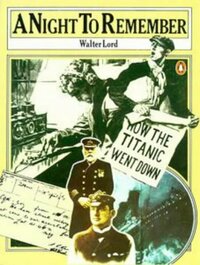You need to sign in or sign up before continuing.
Take a photo of a barcode or cover
4.5 stars
This was utterly fascinating. I don't read a lot of classic nonfiction, but I really liked how this (pub. 1955) was written— it doesn't mess around with a ton of backstory or focus on one person and their life history, it just goes straight to the action and takes you all around the ship, recounting the events and conversations of dozens of passengers as they unfolded, according to meticulously researched recollections. There's no need to get to know or feel emotionally attached to individual people; the entire story is obviously tragic and well-known enough to make you emotionally invested. I cried at multiple points even though the tone isn't sappy or melodramatic. Possibly the most interesting part was the author's assessment of how the world had changed since the Titanic went down (40 years prior to the writing of the book), as well as his critique of how it was reported at the time. To read a 1950s account being critical of how the 1910s disregarded the experiences of the lower classes on the ship was just fascinating.
If I felt like something was missing, it is probably something impossible to recreate in nonfiction— questions that could only be answered by those who did not survive. I do think a more emotionally gripping account is probably out there that I could read someday, but I'm glad I read this "definitive" classic account first.
This was utterly fascinating. I don't read a lot of classic nonfiction, but I really liked how this (pub. 1955) was written— it doesn't mess around with a ton of backstory or focus on one person and their life history, it just goes straight to the action and takes you all around the ship, recounting the events and conversations of dozens of passengers as they unfolded, according to meticulously researched recollections. There's no need to get to know or feel emotionally attached to individual people; the entire story is obviously tragic and well-known enough to make you emotionally invested. I cried at multiple points even though the tone isn't sappy or melodramatic. Possibly the most interesting part was the author's assessment of how the world had changed since the Titanic went down (40 years prior to the writing of the book), as well as his critique of how it was reported at the time. To read a 1950s account being critical of how the 1910s disregarded the experiences of the lower classes on the ship was just fascinating.
If I felt like something was missing, it is probably something impossible to recreate in nonfiction— questions that could only be answered by those who did not survive. I do think a more emotionally gripping account is probably out there that I could read someday, but I'm glad I read this "definitive" classic account first.
I first read this book about the time Robert Ballard discovered the Titanic on the ocean floor. I subsequently saw the movie version when I was in my teens. I revisited the book via audio and have to say that this book holds up really well despite having been written about 70 years ago.
Lord interviewed more than 60 survivors of the Titanic disaster, used newspaper reports from the time, and crafted a sort of docudrama that brings home the heaviness of the tragedy. There are so many stories that are compelling in their telling. But now there are several generations who think James Cameron's movie is the most accurate version, using fictional main characters and winning a boatload of Academy Awards.
Trust me, if you even have a passing interest in The Titanic, this is the gold standard.
Lord interviewed more than 60 survivors of the Titanic disaster, used newspaper reports from the time, and crafted a sort of docudrama that brings home the heaviness of the tragedy. There are so many stories that are compelling in their telling. But now there are several generations who think James Cameron's movie is the most accurate version, using fictional main characters and winning a boatload of Academy Awards.
Trust me, if you even have a passing interest in The Titanic, this is the gold standard.
dark
emotional
fast-paced
Walter Lord perfected narrative nonfiction here. Really captured the agonizingly slow and confusing terror of the night the Titanic sank and we should all feel grateful for the work he put in to compile these stories
A powerful account of the sinking of the Titanic, based on interviews with survivors and witnesses. A quick, worthwhile read.
An extremely well written, emotional account of the Titanic disaster focusing on many of the passengers and their lives. The details are rich, vivid, and engaging, and really help to focus on the humanity of the tragedy.
I work as a historian at a Titanic Artifact Exhibition and am a hardcore enthusiast and this book was helpful supplementary material for me to further understand and engage with the stories of passengers and crew onboard. Meticulously well-researched, and good at separating facts from fiction. Strongly recommend to anyone even vaguely interested in the story of Titanic!
I work as a historian at a Titanic Artifact Exhibition and am a hardcore enthusiast and this book was helpful supplementary material for me to further understand and engage with the stories of passengers and crew onboard. Meticulously well-researched, and good at separating facts from fiction. Strongly recommend to anyone even vaguely interested in the story of Titanic!
adventurous
informative
medium-paced
adventurous
informative
inspiring
reflective
sad
medium-paced
A brilliant and classic book about the sinking of the Titanic. A must read for all those interested in the Titanic. My copy of the book includes a complete list of the passengers aboard the ship, as well as their fate.




